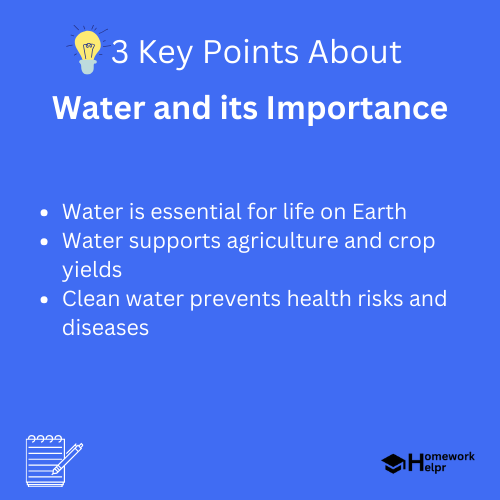📝 Summary
Water is an essential resource that supports all forms of life on Earth, covering approximately 71% of the planet’s surface. It plays a critical role in human, animal, and plant survival, and is involved in several biochemical processes, climate regulation, and ecosystem support. Clean water is vital to prevent diseases, while its scarcity poses a significant global challenge due to population growth, pollution, and climate change. Sustainable practices and education are crucial to ensure water quality and availability for future generations.
Water and Its Importance
Water is one of the most essential substances for all forms of life on Earth. It covers about 71% of the Earth’s surface and is critical for human, animal, and plant survival. The importance of water extends beyond just hydration; it plays a pivotal role in various biochemical processes, the climate, and the ecosystem. Let‚’ dive deeper into the significance of this precious resource.
The Role of Water in Living Organisms
Water is the primary component of cells, making up about 70% to 90% of their mass. It is vital for numerous biological processes, including:
- Hydration: Water is crucial for maintaining the balance of bodily fluids, regulating temperature, and supporting cellular functions.
- Nutrient Transport: Water acts as a medium for transporting essential nutrients and waste products in and out of cells.
- Metabolism: Many metabolic processes, including digestion and energy production, rely on water.
Definition
Bodily Fluids: Fluids found within the body, essential for various physiological functions.
Examples
For instance, when we sweat, our body loses water that needs to be replenished to ensure proper hydration and bodily function.
Water in Agriculture
Agriculture relies profoundly on water for crop production. The significance of water in farming includes:
- Irrigation: Water is used for irrigation to nourish plants and enhance crop yields.
- Soil Moisture: Adequate water is necessary to maintain soil moisture, which is crucial for seed germination and plant growth.
- Livestock: Animals also require water for drinking and maintaining health and productivity.
Without sufficient water, agricultural productivity can severely decline, leading to food shortages.
Water and Climate Regulation
Water plays a critical role in regulating the Earth’s climate. Here‚’ how:
- Heat Absorption: Water has a high specific heat capacity, meaning it can absorb and retain heat. This property helps regulate temperature.
- Weather Patterns: The distribution of water on Earth influences weather patterns and precipitation.
- Greenhouse Gas Role: Water vapor is a significant greenhouse gas, which contributes to the greenhouse effect and climate change.
Definition
Specific Heat Capacity: The amount of energy required to raise the temperature of a substance by one degree Celsius.
Examples
For example, bodies of water like oceans and lakes can moderate local climates by absorbing heat in the summer and releasing it in the winter.
Water and Ecosystems
Water is a key component of various ecosystems, supporting life in multiple forms. Here‚’ its role:
- Aquatic Habitats: Rivers, lakes, and oceans provide habitats for countless species of plants and animals.
- Biodiversity: Water bodies contribute to biodiversity by creating diverse environments for different life forms.
- Food Chain: Water is foundational to food chains, as various organisms depend on aquatic environments for survival.
❓Did You Know?
Did you know that around 70% of the world’s freshwater is locked in ice caps and glaciers?
The Importance of Clean Water
While water is essential, the quality of water is equally important. Clean water is necessary to prevent diseases and maintain health. Key points to consider include:
- Health Risks: Contaminated water can lead to various diseases, including cholera and dysentery.
- Sustainable Practices: Sustainable water management is critical to ensure that everyone has access to clean water.
- Water Conservation: Practices such as rainwater harvesting and wastewater treatment are vital for preserving water quality.
Definition
Contaminated Water: Water that contains harmful chemicals or microorganisms that can pose health risks.
Examples
For example, treating sewage before it is released into rivers helps prevent the spread of waterborne diseases.
Water Scarcity: A Global Challenge
Despite the abundance of water on Earth, access to clean and safe water is becoming increasingly challenging. Water scarcity is characterized by:
- Population Growth: As populations increase, the demand for water outstrips supply.
- Pollution: Industrial waste and agricultural runoff pollute waterways, reducing the availability of clean water.
- Climate Change: Changes in climate patterns lead to droughts in some regions while causing floods in others.
The Way Forward: Preserving Our Water Resources
To secure water for future generations, we need to adopt measures to preserve and protect this invaluable resource. Strategies include:
- Conservation Education: Educating communities about the importance of conserving water.
- Sustainable Infrastructure: Developing infrastructure that promotes efficient water use and minimizes waste.
- Policy Implementation: Governments should create policies that encourage the sustainable management of water resources.
Definition
Infrastructure: The basic physical and organizational structures needed for the operation of a society.
Conclusion
Water is a crucial element that affects every aspect of life, from sustaining human and animal health to ensuring the survival of ecosystems. The challenges of water scarcity and pollution emphasize the need for responsible usage and conservation efforts. By understanding the importance of water and advocating for its sustainability, we can help ensure that this vital resource remains available for generations to come.

Related Questions on Water and its Importance
What percentage of Earth’s surface is water?
Answer: About 71% of Earth’s surface is covered with water.
Why is clean water important?
Answer: Clean water prevents diseases and maintains health.
What causes water scarcity?
Answer: Population growth, pollution, and climate change contribute to water scarcity.
How can we preserve water resources?
Answer: Through conservation education, sustainable infrastructure, and policy implementation.
